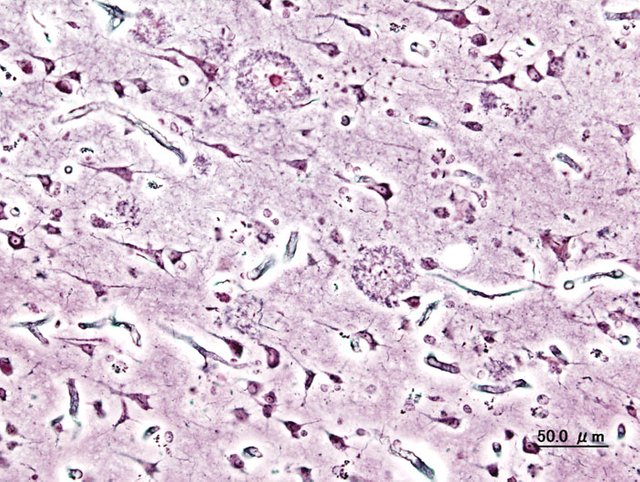Reason for Alzheimer's finally found?
Alzheimer's Desease is a devestating illness. It makes about 2/3 of the world's dementia patients. So far it is not healable. Projections say that in 2050 more than 1 of 100 people may have Alzheimer.
For medicine Alzheimer's is a sort of mythical beast. More than 100 years after Alois Alzheimer first described the illness, it is still unknown what causes the desease.
But maybe the reason is finally found.
We already know that amyloid plagues and in the brain and tau proteins are typical for Alzheimer, but not if those are creating the desease or just a byproduct. And, most importantly, we don't know what causes them.
Until now.

Alzheimer brain cells, Wikimedia
Several studies have found that Porphyromonas gingivalis, a bacteria that causes chronic gum desease, seems to be responsible for Alzheimer's.
Multiple research teams have been investigating P. gingivalis, and have so far found that it invades and inflames brain regions affected by Alzheimer’s; that gum infections can worsen symptoms in mice genetically engineered to have Alzheimer’s; and that it can cause Alzheimer’s-like brain inflammation, neural damage, and amyloid plaques in healthy mice.
This isn't a final verdict, but the evidence heavily points that P. gingivalis is the main culprit or at least a decisive complice in the crime.
That also means that we might find a protection or even a cure for Alzheimer's in a matter of years.
Modern materialistic science, and their cohort rockeeperson medicine will never discover the reason for alzheimer's.
It is outside the area of what they consider "science".
First they would have to accept that the mind is not in the brain.
Then they would have to understand where diseases actually come from.
( a crude, but factual statement is that disease is actually dis-ease solidified into the body)
Alzheimer's happens because people become to ridged in their thought process and their day (activity) process. They get stuck and can no longer grow, so a process happens whereby they lose their memory of the thoughts that kept them constrained.